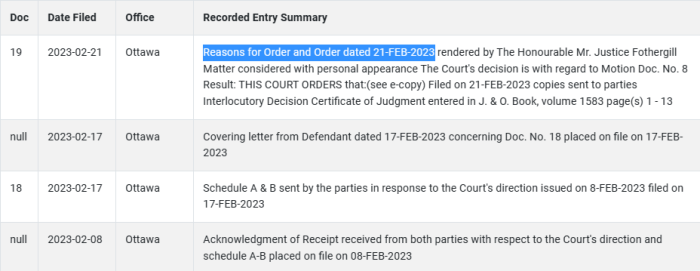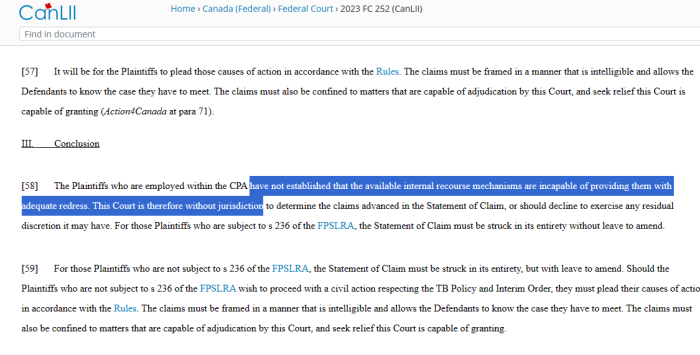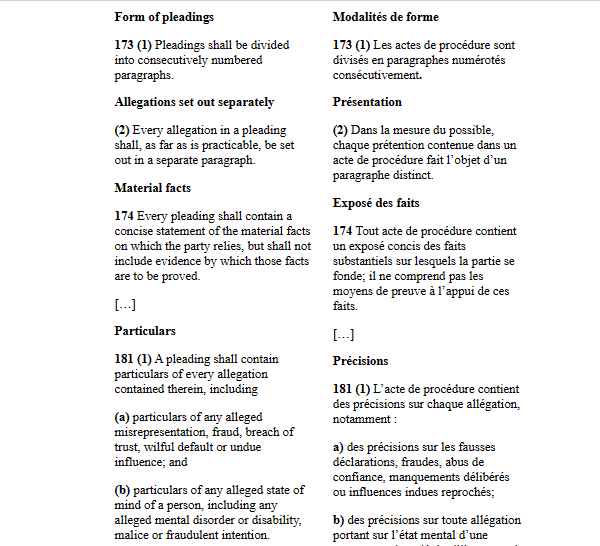
February 2023, a lawsuit by over 600 Federal workers, and workers of Federally regulated industries, was struck in its entirety by Justice Fothergill. November 8th, the Federal Court of Appeals will review the case. Spoiler: the Appeal will be dismissed.
To describe briefly, the Statement of Claim was struck without leave (or permission) to amend against 400 Plaintiffs on the grounds that they were barred by Section 236 of the Federal Public Sector Labour Relations Act, or FPSLRA. Government workers, for the most part, don’t have the right to sue their employer.
This didn’t apply to non-Government workers, such as in banking or aviation. However, the Claim was drafted so poorly that it was struck anyway, but with leave to amend.
The Appeal is baseless, and will go nowhere.
While there are many errors in the original case, here are 3 big ones:
1. Federal Workers Barred From Litigation, Must Grieve Instead

Right of employee
208 (1) Subject to subsections (2) to (7), an employee is entitled to present an individual grievance if he or she feels aggrieved (a) by the interpretation or application, in respect of the employee, of
(i) a provision of a statute or regulation, or of a direction or other instrument made or issued by the employer, that deals with terms and conditions of employment, or
(ii) a provision of a collective agreement or an arbitral award; or
(b) as a result of any occurrence or matter affecting his or her terms and conditions of employment.
No Right of Action
Disputes relating to employment
236(1) The right of an employee to seek redress by way of grievance for any dispute relating to his or her terms or conditions of employment is in lieu of any right of action that the employee may have in relation to any act or omission giving rise to the dispute.
Application
236(2) Subsection (1) applies whether or not the employee avails himself or herself of the right to present a grievance in any particular case and whether or not the grievance could be referred to adjudication.
Taken together, Sections 208 and 236 of the FPSLRA give Federal employees the right to grieve, something that often ends in arbitration. However, they don’t necessarily have a right to sue in Court.
Now, there is (somewhat) of a way around this. If Litigants can demonstrate that the grievance process is seriously flawed or corrupted, they may get a Court to hear this. However, that didn’t happen, nor does it appear to have been attempted.
Not only was this case not beneficial to the public, but it was used as precedent in at least 3 more rulings, denying litigants access to the Courts:
(A) Davis v. Canada (Royal Mounted Police), 2023 FC 280
(B) Horsman v. Canada (Fisheries, Oceans and Coast Guard), 2023 FC 929
(C) Doe v Canada (Attorney General), 2023 BCSC 1701
The Appellants allege that Justice Fothergill failed to give reasons for denying their Claim, but he did. It’s in Paragraphs 10-36 of the ruling. Granted, it’s not one that will satisfy them, but it is addressed.
2. Claim Fails To Follow Basics Of Civil Procedure

This comes from Paragraph 39 of the ruling, and lists some of the more obvious problems that came up with this lawsuit. The Federal Court Rules should be known to anyone who brings a case, as they outline the process for doing so.
As stated previously, lawsuits must be written well enough so that the opposing sides (and the Judge) are able to understand what’s going on. This isn’t optional.
173 (1) Pleadings shall be divided into consecutively numbered paragraphs.
Allegations set out separately
(2) Every allegation in a pleading shall, as far as is practicable, be set out in a separate paragraph.
Material facts
174 Every pleading shall contain a concise statement of the material facts on which the party relies, but shall not include evidence by which those facts are to be proved.
Particulars
181 (1) A pleading shall contain particulars of every allegation contained therein, including
(a) particulars of any alleged misrepresentation, fraud, breach of trust, willful default or undue influence; and
(b) particulars of any alleged state of mind of a person, including any alleged mental disorder or disability, malice or fraudulent intention.
When it’s stated that “particulars” are required, this means specific information. There’s an extra burden on the Party making the claims to ensure that they are spelled out. That wasn’t done here, nor was it done in several related anti-lockdown suits.
The case was struck as “bad beyond argument“, and rightfully so. While the non-Government Plaintiffs have the right to refile, they may wish to retain better counsel.
The Claim was struck — in part — as the basics of drafting weren’t followed. The Claim heavily mirrored the Action4Canada case, also struck as “bad beyond argument“.
The Appeal (bizarrely) criticizes Justice Fothergill for relying on the Action4Canada case as a precedent. It’s unclear why, unless this is deliberate obfuscation. The parallels are striking. Although the Federal Claim is much shorter, it has substantially the same defects.
3. Large Portions Of Claim Outside Jurisdiction Of Federal Court
[Para 53] Justice Ross granted leave to the plaintiffs in Action4Canada to amend their pleading. However, he specified that numerous claims, some of which are also advanced in the present proceeding, are improper in a civil action (Action4Canada at paras 52-53). These include allegations of criminal behaviour, broad declarations respecting the current state of medical and scientific knowledge, and a declaration that administering medical treatment without informed consent is a crime against humanity.
This should be obvious. If someone is going to commence litigation, it must be over issues that a Court can at least theoretically preside over. Yes, the merits of the case will need to be determined. However, if there are jurisdiction problems, then everything comes to a stop immediately.
The same problems occurred with the Action4Canada case, with Justice Ross saying:
[52] The defendants submit that the NOCC pleads to a number of claims that are improper in a civil action. In part, the defendants point to the following elements of the NOCC as inappropriate:
a) alleging criminal conduct;
b) seeking a declaration that the preponderance of the scientific community is of the view that masks are ineffective in preventing transmission;
c) seeking a declaration that the motive and execution of the COVID-19 prevention measures by the World Health Organization are not related to a bona fide “pandemic”;
d) seeking a declaration that administering medical treatment without informed consent constitutes experimental medical treatment which is contrary to the Nuremberg Code, the Helsinki Declaration and is a crime against humanity under the Criminal Code of Canada;
e) seeking a declaration that the unjustified, irrational, and arbitrary decisions of which businesses would remain open, and which would close, as being “essential”, or not, was designed and implemented to favour mega-corporations and to de facto put most small businesses out of business; and
f) seeking a declaration that the measures of masking, social distancing, PCR testing, and lockdowns are not scientifically based, and are based on a false and fraudulent use of the PCR test.
[53] I agree with the defendants that these are improper claims.
This shows why the Action4Canada case was used to help with striking the Federal one. Not only are both poorly written — and don’t follow the Rules of Civil Procedure — but both make demands that Civil Courts can’t realistically grant.
In other news:
Action4Canada then appealed the findings that the B.C. Supreme Court couldn’t preside over such matters, but then let the case sit. It went “inactive” until called out.
Vaccine Choice Canada’s July 2020 case is also facing a Motion to Strike in Ontario in the new year. It will be thrown out for much the same reasons. The case was idle from 2020 until January 2023, when the Motion was finally brought.
Vaccine Choice Canada’s October 2019 lawsuit challenging regulations around immunizing Ontario students hasn’t had a single Court appearance, despite being filed over 4 years ago.
Take Action Canada arranged for a mass filing in Ontario, and the Statement of Claim is a virtual clone of the Federal one. It contains the same challenges which a Civil Court can’t grant. It’s sat dormant since. Because the Plaintiffs (police, fire fighters, paramedics, etc…) are mainly unionized, jurisdiction will be an issue for them as well.
An April 2021 Application organized by Police On Guard, and another from Children’s Health Defense (Canada), aren’t being pursued. Despite being filed nearly 3 years ago, neither have had a single Court appearance.
Also, after the Federal case was struck, there was an email sent out to all 600 or so Plaintiffs, asking for more money. The “freedom business” has turned out to be quite lucrative. Apparently, the $1,000 per head retainer didn’t cover this Appeal, and was only meant to cover Trial costs.
But of course, we all know none of these claims will ever get to Trial.
How much money has been pumped into these nothing-burger lawsuits?
FEDERAL VAXX PASS CHALLENGE (APPEAL)
(1) FCA Adelberg V. HMTK A-67-23 Notice Of Appeal
(2) FCA Adelberg V. HMTK A-67-23 Appeal Book
(3) FCA Adelberg V. HMTK A-67-23 Appellants MFL
(4) FCA Adelberg V. HMTK A-67-23 Respondents MFL
FEDERAL VAXX PASS CHALLENGE
(1) https://policeonguard.ca/wp-content/uploads/2022/06/Filed-SOC.pdf
(2) Federal Court Vaccine Mandate Challenge
(3) Federal Vaccine Passport Challenge Retainer Agreement
(4) Federal Court Vaccine Mandate Challenge Motion To Strike
(5) Federal Court Vaccine Mandate Challenge Affidavit Of Service
(6) Federal Court Vaccine Mandate Challenge Responding Motion Record
(7) Federal Court Of Canada Rules
(8) Federal Court Decision On Motion To Strike (Archive)
(9) https://decisions.fct-cf.gc.ca/fc-cf/decisions/en/item/522970/index.do
(10) https://www.canlii.org/en/bc/bcsc/doc/2022/2022bcsc1507/2022bcsc1507.html
(11) https://laws-lois.justice.gc.ca/eng/regulations/sor-98-106/page-9.html#h-1013947
(12) https://www.laws-lois.justice.gc.ca/eng/acts/P-33.3/page-13.html#h-406405
PRECEDENTS CREATED
(1) https://www.canlii.org/en/ca/fct/doc/2023/2023fc280/2023fc280.html#par85
(2) https://www.canlii.org/en/ca/fct/doc/2023/2023fc929/2023fc929.html#par17
(3) https://www.canlii.org/en/bc/bcsc/doc/2023/2023bcsc1701/2023bcsc1701.html#par30
MONEY
(1) Letter to Federal Worker Plaintiffs
(2) Federal Workers Action Donation Link For PayPal
(3) Ontario First Responders Action Donation Link For PayPal
(4) School Action Donation Link For PayPal
(5) Police Officer Action Donation Link For PayPal
(6) https://www.web.archive.org/web/20220526170932/https://www.constitutionalrightscentre.ca/
(7) Federal Workers Retainer Agreement
(8) Ontario First Responders Retainer Agreement
(9) Donate To Public Citizens Inquiry
(10) Donations For Supposed B.C. Doctors Action
